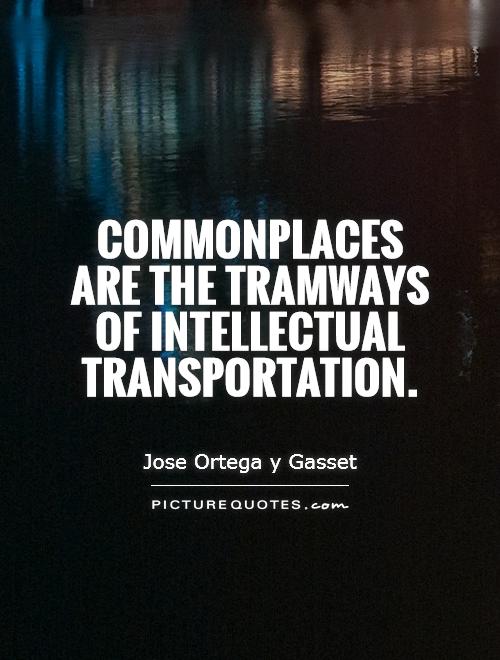Commonplaces are the tramways of intellectual transportation

Commonplaces are the tramways of intellectual transportation
In the context of José Ortega y Gasset, the statement "Commonplaces are the tramways of intellectual transportation" holds significant meaning. Ortega y Gasset was a Spanish philosopher and essayist known for his ideas on the nature of human existence and the role of tradition in society. He believed that commonplaces, or widely accepted ideas and beliefs, serve as the foundation for intellectual exploration and growth.Ortega y Gasset argued that commonplaces act as the tramways of intellectual transportation because they provide a starting point for deeper thought and analysis. Just as tramways guide a tram along a predetermined path, commonplaces guide our thinking in a certain direction. They offer a framework within which we can explore new ideas and perspectives, allowing us to build upon existing knowledge and understanding.
However, Ortega y Gasset also warned against becoming too reliant on commonplaces. He believed that blindly accepting conventional wisdom without questioning or challenging it can lead to intellectual stagnation. Instead, he encouraged individuals to critically examine and interrogate commonplaces in order to uncover deeper truths and insights.
For Ortega y Gasset, intellectual transportation was not simply about moving from one idea to another, but about engaging in a process of self-discovery and self-realization. By questioning and challenging commonplaces, we are able to expand our understanding of the world and ourselves, ultimately leading to personal growth and development.












 Friendship Quotes
Friendship Quotes Love Quotes
Love Quotes Life Quotes
Life Quotes Funny Quotes
Funny Quotes Motivational Quotes
Motivational Quotes Inspirational Quotes
Inspirational Quotes